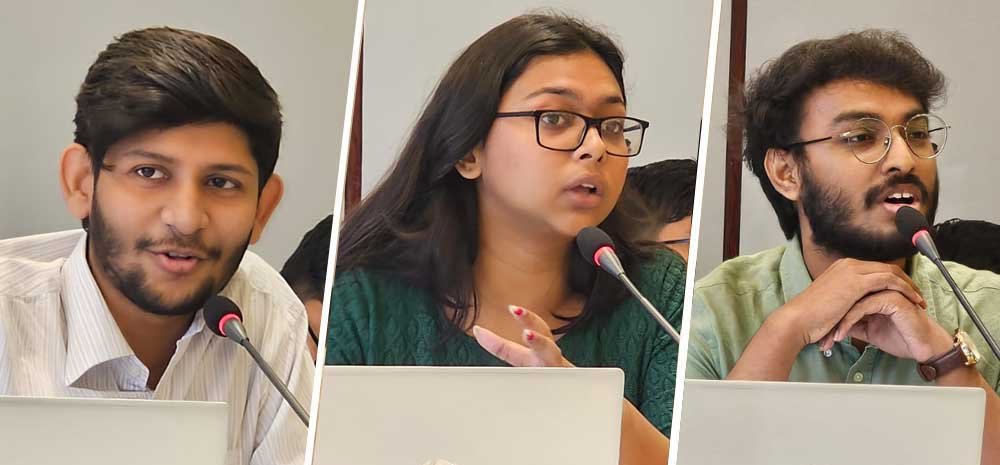
Young Scholar Seminar Series (YSSS) is a capacity-building initiative undertaken by the Centre for Policy Dialogue (CPD) in 2006 to encourage in-house discussions where young researchers present their ongoing work and receive peer feedback. This programme is designed to develop the research skills, analytical presentation, and articulation skills of young professionals.
As a part of this on-going capacity-building programme, the 61st Young Scholar Seminar Series (YSSS) in-house session took place on 30 November 2023. Ms Isabela Mumu Rozario, Programme Associate, CPD, Mr Mahrab Al Rahman, Programme Associate, CPD and Mr Faisal Quaiyyum, Research Intern, CPD, showcased their research papers at the session. Dr Fahmida Khatun, Executive Director, CPD, chaired the session.
The research paper on ‘Rural-urban migration in the construction industry in Bangladesh: A case study in Aftabnagar, Dhaka’ was presented by Isabela Mumu Rozario.
The study aimed to explore the demographic and socioeconomic traits of construction workers, uncover career motivators, and assess workplace safety protocols. Utilising a mixed methodology, such as survey and Focused Group Discussion (FGD), 121 workers from 21 sites participated via convenience sampling.
The findings underscored a predominant male demographic, constituting 95.1 per cent, with a youth age bracket ranging from 16 to 25 years old. This group is characterised by limited educational attainment, often migrating in pursuit of employment opportunities and higher wages, driven by the challenges of poverty and unemployment. Safety concerns revealed deficiencies in protective gear, with significant percentages lacking essential equipment and suffering chronic pain.
As recommendations, Ms Rozario proposed implementing formal hiring practices, leveraging law enforcement and regulatory measures, and introducing educational and vocational training initiatives.
Mr Mahrab Al Rahman presented on the topic ‘Impact of Trade on Inequality Among the Globalisation Factors: A study on Bangladesh’.
Trade plays a pivotal role in national economies, theoretically fostering income growth and reducing inequality. However, diverse research indicates trade’s impact on inequality varies across countries. This study aimed to examine how globalisation, especially trade, influenced economic disparity in Bangladesh.
Using the Vector Error Correction Model (VECM) from 1980 to 2016, short-term and long-term dynamics were analysed. The consumption Gini index was pivotal, revealing no substantial trade-inequality link in the short run but a notable negative correlation in the long run, suggesting trade’s role in decreasing consumption inequality in Bangladesh.
Presentation on the topic ‘Lights Out, Stress In: Assessing Stress Amidst Energy and Power Challenges in Bangladesh’ was presented by Mr Faisal Quaiyyum.
Initially, Mr Quaiyyum highlighted the ongoing primary data collection phase, summarising the research’s aims, motivations, and methodologies. This study aims to create a comprehensive household stress index related to energy challenges, tracking stress changes, and analysing energy consumption.
Quantitative Psychological Framework; Principal Component Analysis; Estimation Model; and Primary Survey Design — four methodologies were used in this research. Utilising a sample of 1000 households from 36 districts, the study employs the Perceived Stress Scale 10 (PSS-10) to gauge stress levels across six power and energy challenge categories. An econometric model correlated the nationally constructed stress index and stress levels with various socio-economic, demographic, and behavioural factors to inform policy urgency.
Professor Mustafizur Rahman, Distinguished Fellow, CPD and Mr Khondaker Golam Moazzem, Research Director, CPD offered valuable input to the presenters. Mr Avra Bhattacharjee, Joint Director, Dialogue and Outreach, Mr Towfiqul Islam Khan, Senior Research Fellow, Mr Muntaseer Kamal, Research Fellow, CPD, Mr Syed Yusuf Saadat, Research Fellow, CPD, Senior Research Associates, Research Associates, Programme Associates, Interns of CPD, and many others attended the session. Many actively engaged in an open floor discussion, sharing insightful contributions.


